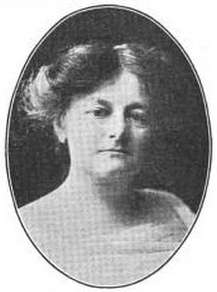Emilie Frances Bauer
Emilie Frances Bauer (pseudonym: Francisco di Nogero; March 5, 1865 – March 9, 1926) was an American music critic, editor, composer, and pianist.
Emilie Frances Bauer | |
|---|---|
 Emilie Frances Bauer, from a 1912 publication. | |
| Born | March 5, 1865 Walla Walla, Washington |
| Died | March 9, 1926 (aged 61) New York, New York |
| Nationality | American |
| Other names | Francisco di Nogero (pseudonym) |
| Occupation | Writer, editor, composer, pianist, arts critic |
Early life
Emilie Frances Bauer was born in Walla Walla, Washington, the daughter of Jacques Bauer (1834-1890) and Julia Heyman Bauer. She may have been the first Jewish child ever born in Walla Walla.[1] Both parents were immigrants from Alsace; her father was a shopkeeper and her mother a teacher.[2] She studied music with her father, with Miguel Espinosa in San Francisco, and at the Paris Conservatoire. She was the older sister and first piano teacher of composer Marion Bauer.[3][4]
Career
Bauer taught piano in Walla Walla and Portland, Oregon. She was a music critic for Portland Oregonian, editor for the Musical Courier, music teacher in Boston (1896), editor for The Musical Leader (1900–1926), editor of a women's page in The Etude (1902–1903), critic for the New York Evening Mail (1906-1912), weekly contributor to the San Francisco Chronicle, Portland Oregonian and the Concertgoer.[3][5] While she was living in San Francisco in 1912, she gave a lecture series on music.[6]
Bauer sometimes wrote and composed music under the masculine pen-name "Francisco di Nogero". Among her known compositions were the songs "My Love is a Muleteer" (1917)[7] and "Our Flag in France" (1917).[8] For the latter song, she donated the royalties to the American Ambulance Hospital in Paris.[9] In 1918, she and her sister were guests of honor at a musicale hosted by the Brooklyn Music School Settlement.[10]
Personal life
Emilie Frances Bauer died in 1926, aged 61 years, in New York City.[5] In February 2020, the Fort Walla Walla Museum held a program of music by Emilie Frances Bauer and Marion Bauer.[11]
References
- "MUSEUM AFTER HOURS: THE BAUER SISTERS; FROM WALLA WALLA TO CAREERS IN NYC". Union-Bulletin. Retrieved 2020-05-11.
- "Notes for "Music of Marion Bauer"". DRAM Online. Retrieved 2020-05-12.
- Pickett, Susan E. (2014-12-29). Marion and Emilie Frances Bauer: From the Wild West to American Musical Modernism. ISBN 978-1-4834-2292-3.
- Eskin, Virginia (2020-04-22). "An American Scriabin?". The Boston Musical Intelligencer. Retrieved 2020-05-11.
- "Untitled item". Dayton Daily News. 1926-03-21. p. 39. Retrieved 2020-05-12 – via Newspapers.com.
- "Emilie Frances Bauer in Lecture on Music". The San Francisco Call. 1912-09-18. p. 6. Retrieved 2020-05-12 – via Newspapers.com.
- Nogero, Francisco di; Bauer, Emilie Frances (1917). My Love is a Muleteer: Song. A. P. Schmidt.
- Bauer, Emilie Frances (1917). "Our flag in France". Historic Sheet Music Collection, Oregon Digital. Retrieved 2020-05-12.
- "Song Royalties for the Wounded". The Musical Leader. 34: 84. July 26, 1917 – via HathiTrust.
- "Musicale at the Music School Settlement". Brooklyn Life. 1918-04-27. p. 11. Retrieved 2020-05-12 – via Newspapers.com.
- Malgesini, Tammy (February 22, 2020). "Museum program tunes into Bauer sisters". East Oregonian. Retrieved 2020-05-11.